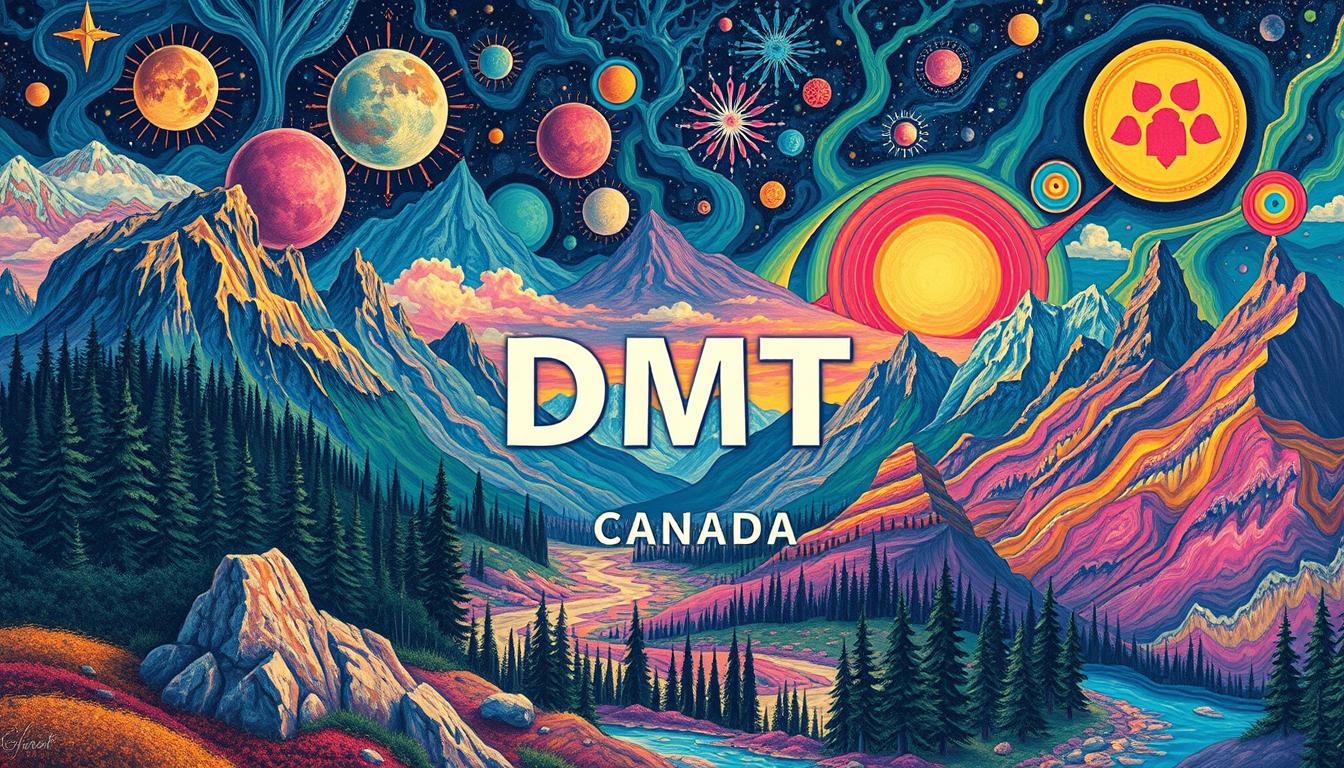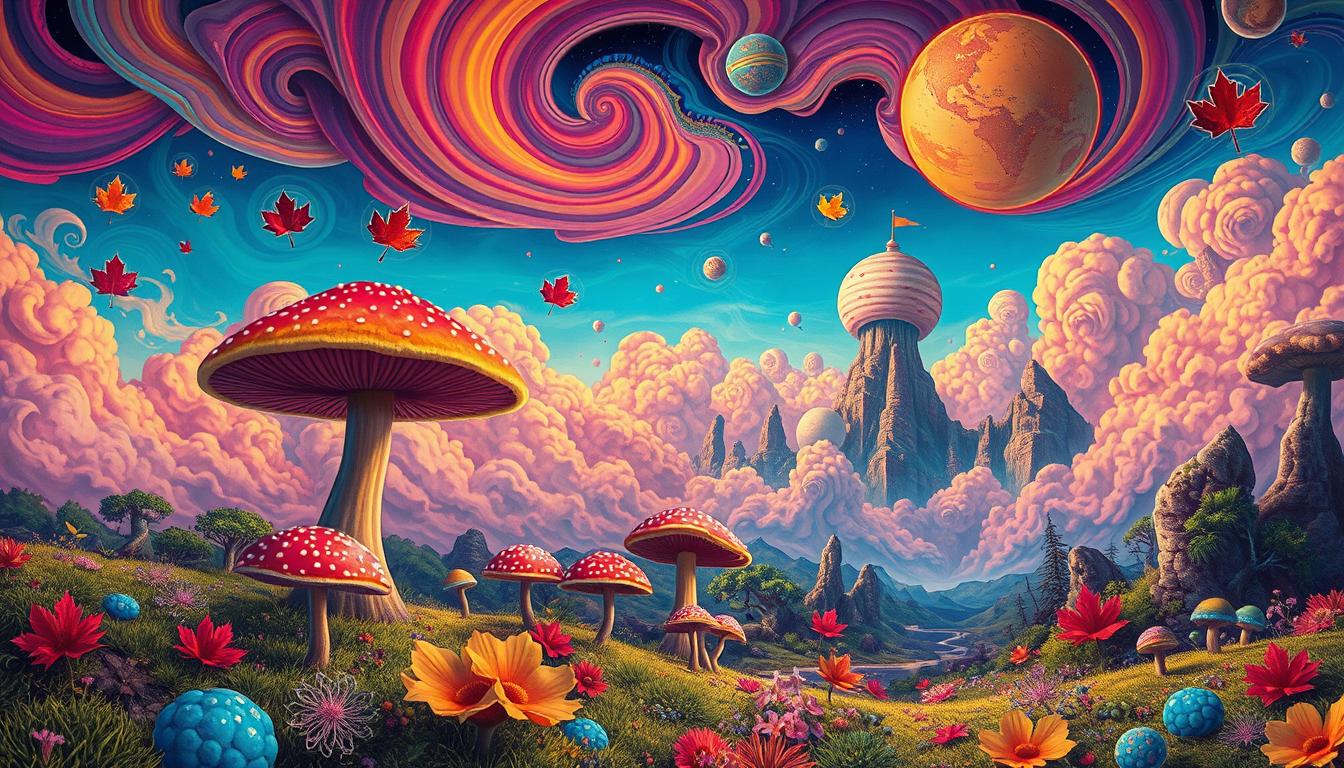Articles
DMT Legalization Updates in Canada
In Canada, the world of psychedelic substances is changing. DMT is getting more attention. It’s listed as a controlled substance under the Controlled Drugs and Substances Act (CDSA). This has sparked a lot of talk and debate.
Recently, Alberta made changes to its laws. There’s also research into DMT’s possible health benefits. So, the big question is: What does the future hold for DMT legalization in Canada?
Key Takeaways
- Canada’s view on psychedelic substances, like DMT, is shifting. Cities like Vancouver and Toronto have made some changes.
- The Controlled Drugs and Substances Act (CDSA) currently classifies DMT as a controlled substance. There are exceptions for medical, scientific, or public interest.
- In January 2023, Alberta became the first Canadian province to allow the medicinal use of psychedelics, including DMT, for psychiatric disorders.
- Getting access to DMT and other psychedelics for therapy in Canada is tricky. It needs licensed doctors and special places.
- Research is looking into DMT and other psychedelics for treating mental health issues. This includes anxiety, depression, PTSD, and substance use disorders.
Understanding DMT and Its Significance
DMT, or Dimethyltryptamine, is a fascinating psychedelic compound found naturally in plants and the human brain. It has been used for centuries in traditional spiritual and cultural practices, mainly in South American indigenous cultures. DMT is known for its intense, yet short-lived psychedelic effects, often described as a “breakthrough” experience that can profoundly impact an individual’s consciousness and perception.
The cultural and historical context of DMT is deeply rooted in its ritual and ceremonial use. In many indigenous traditions, DMT-containing plants like ayahuasca have played a central role in spiritual and shamanic practices. They serve as a tool for introspection, healing, and connecting with the divine. The significance of DMT extends beyond its psychoactive properties, as it has been revered for its role in psychedelic decriminalization Canada and entheogenic plant medicine regulations.
What is DMT?
DMT is a naturally occurring tryptamine compound found in various plant species and the human brain. When consumed, DMT can induce a powerful, short-lived psychedelic experience. This experience is characterized by intense visual hallucinations, altered perceptions of time and space, and a profound sense of connection with the universe. The effects of DMT are often described as transcendent, spiritual, and even life-changing for those who have experienced it.
“DMT is the most powerful psychedelic substance on Earth. It’s a profound and sacred tool that has been used for thousands of years in spiritual and shamanic practices.”
Cultural and Historical Context of DMT
The use of DMT-containing plants, like ayahuasca, has a long and rich history in indigenous cultures of the Amazon basin and beyond. These entheogenic plant medicines have been integral to the spiritual and healing practices of many indigenous communities. They serve as a means to connect with the divine, access profound insights, and facilitate personal and communal transformation.
The cultural significance of DMT extends beyond its psychoactive properties. It has played a vital role in the preservation and transmission of traditional knowledge, rituals, and worldviews. The reverence for DMT and other psychedelics as entheogenic plant medicine regulations has been a key aspect of the spiritual and cultural identity of many indigenous communities. The ongoing psychedelic decriminalization Canada movement seeks to honor and protect these sacred traditions.
Current Legal Status of DMT in Canada
In Canada, DMT is classified as a Schedule III controlled under the Controlled Drugs and Substances Act (CDSA). This means that having, making, and selling DMT are illegal without Health Canada’s permission. But, the laws about DMT in Canada are changing and complex.
Overview of Controlled Substances Act
The CDSA controls many psychoactive substances, including DMT. While having DMT is not allowed, Health Canada can give special permits for research or medical use. Also, the Special Access Program lets doctors get restricted drugs like DMT for patients with serious conditions.
Recent Legal Cases Involving DMT
DMT’s legal status has been challenged in recent years, with some individuals seeking exemptions for religious or therapeutic use. A group of people argued that banning DMT was against their Charter rights to freedom of religion. Even though they lost, it showed the ongoing debate about DMT’s legal status in Canada.
“The legal landscape surrounding DMT in Canada is complex and evolving, with ongoing discussions around the legal status of psychedelics, including DMT.”
As Canada talks more about legalizing psychedelics, DMT’s future is unclear. Supporters are pushing for clear laws for DMT and other psychedelics. They want to make sure these substances are safe and healthy for everyone.
Recent Legislative Changes Regarding DMT
In Canada, recent laws have focused on psychedelics in general. The government is open to studying DMT for its healing powers. Alberta became the first province to allow psychedelic therapy in January 2023.
At the federal level, Health Canada has made some big moves. They’ve allowed psilocybin for end-of-life care and treatment-resistant depression. This could pave the way for DMT’s use in therapy. The government also supports research into psychedelics for mental health.
Key Motions and Proposals
DMT is illegal in Canada, but there are efforts to change that. Advocates and groups want to use DMT for therapy. Some politicians are pushing for these changes.
Government Statements on DMT
The Canadian government is cautiously optimistic about psychedelics. They see the need for more research and a careful approach. As interest in psychedelic therapy grows, the government’s views are likely to change.
Impact of DMT on Mental Health Treatment
Research on DMT, a plant-based psychedelic, is growing in Canada and worldwide. It might help with depression, anxiety, and addiction. DMT’s quick start and short effects could be a plus in therapy.
Research Studies Supporting DMT Use
Canadian scientists are leading the way in DMT research. They’re studying how DMT affects the brain. DMT is a Schedule I substance, meaning it’s seen as having high abuse risk and no medical use. But early studies hint at its possible benefits for mental health.
“DMT typically induces psychological effects within seconds to minutes when smoked or vaporized, lasting 15 to 30 minutes, but can extend to several hours in ayahuasca ceremonies.”
Comparisons with Other Psychedelics
DMT’s legal hurdles limit its research and use, but experts see its value. Psilocybin and its metabolite psilocin are Schedule III substances in Canada, making them illegal. Yet, Canada is easing research and access to psilocybin. This could help pave the way for DMT’s future use.
Advocacy Efforts for DMT Legislation
The fight for DMT legalization updates in Canada is part of a bigger push to change how we view psychedelic drugs. Groups like the Canadian Psychedelic Association and Therapsil lead the charge. They push for laws that make these substances more accessible, mainly for their health benefits.
Notable Organizations Supporting Legalization
The Canadian Psychedelic Association is working hard to make ayahuasca legality Canada a reality. They aim to teach people, talk to lawmakers, and fund research on psychedelics. Therapsil, focused on patients, has helped get psilocybin and other psychedelics approved for special cases.
Grassroots Movements and Their Influence
Grassroots groups are also making a big difference. In cities like Vancouver and Toronto, local efforts are changing how people see drug laws. They focus on the good DMT and other psychedelics can do, and the need for safer drug policies.
“The Canadian government’s recent changes to drug laws show they’re open to the benefits of psychedelics like DMT.”
As the push for ayahuasca legality Canada grows, the work of groups and grassroots efforts will shape policy. Together, they aim to bring about real changes in how Canada views these substances.
Public Opinion on DMT Legalization
In Canada, the talk about DMT policy reform is getting louder. More people are starting to see the value in using entheogenic plant medicines. Surveys show that many are now open to using psychedelics like DMT for mental health.
A study by Nanos Research found that 82% of Canadians support using psilocybin therapy for those facing end-of-life trauma. Also, 78% would back a government that legalizes psilocybin therapy for this condition. This shows a shift towards accepting psychedelic-assisted therapies, including DMT.
Perspectives from Mental Health Professionals
Experts in mental health are also seeing the benefits of DMT and other psychedelics. They want more research and access to these substances for medical use. In July 2022, over 100 Canadian healthcare professionals asked for a judicial review of Health Canada’s decision on psychedelics.
Even with growing support, there are worries about DMT’s safety and misuse. It’s important to have strict rules and education to handle these concerns. This way, Canada can move forward with DMT policy reform and entheogenic plant medicine regulations responsibly.

Canada’s Approach to Other Psychedelics
Canada is exploring the world of psychedelic decriminalization. This includes substances like psilocybin and LSD. Psilocybin, found in mushrooms, is gaining acceptance for treating anxiety at the end of life. LSD, on the other hand, is controlled but being studied for medical uses.
The legalization of cannabis in Canada shows a path for psychedelic policy. It shows the need for careful rules and education. This could help Canada balance the benefits of psychedelics with safety concerns.
Comparison to Psilocybin and LSD
DMT, a strong psychedelic found in plants, hasn’t gotten as much attention in Canada yet. But, the growing acceptance of psilocybin for medical use is a positive sign. It could lead to more openness towards DMT in the future.
Lessons Learned from Other Substance Legalizations
Canada’s experience with cannabis legalization offers important lessons. It highlights the need for strong rules, education, and balancing safety with benefits. These lessons could guide Canada’s approach to psychedelic decriminalization.
Potential Economic Impacts of DMT Legalization
As DMT legalization in Canada becomes more likely, people are interested in its economic effects. The psychedelic industry, which includes DMT, is expected to grow a lot. Legalizing DMT could also lead to new jobs in research, therapy, and more.
Market Projections and Industry Growth
The Canadian psychedelic market is looking promising. Australia has legalized medicinal use of MDMA and psilocybin. Alberta, Canada, is the first to regulate psychedelics for medicine, which could bring economic benefits.
The cannabis industry in Canada is a good example. It added $43.5 billion to GDP and created 98,000 jobs in three years after legalization. This shows the economic impact DMT legalization could have.
Job Creation Opportunities in the Psychedelic Sector
Legalizing DMT could lead to new jobs in the psychedelic field. These jobs might be in research, clinical trials, therapy, and making and selling DMT products. But, experts say we shouldn’t compare it too closely to the cannabis industry.
The legal status of psychedelics, including DMT, is changing in Canada and worldwide. The economic benefits of legalization are a big topic of discussion. The cannabis industry’s success is a guide, but the psychedelic sector has its own challenges and opportunities.

“The legalization of DMT could pave the way for the creation of new jobs in the psychedelic sector, including positions in research, clinical trials, therapy, and the manufacturing and distribution of DMT-based products.”
Challenges in the DMT Legalization Process
Canada is looking into using dimethyltryptamine (DMT) for health benefits. But, there are big challenges ahead. These include dealing with complex laws, public safety worries, and myths about DMT and other psychedelics.
Legal and Regulatory Hurdles
The main hurdle is changing the Controlled Drugs and Substances Act (CDSA). This law makes DMT, a Schedule III substance, illegal. Creating rules for DMT’s use in medicine is hard and takes time. It needs careful thought from many groups.
Public Safety Concerns and Misconceptions
There’s also worry about DMT and other psychedelics. The opioid crisis has made people more cautious. It’s important to teach people and leaders about DMT’s benefits and safety.
It’s hard to make sure DMT is used safely while helping those who need it. Setting up rules for DMT’s use in medicine is a big task. Canada is exploring new paths in this area.
“The psychedelic compounds industry is projected to grow from $2 billion in 2020 to $10.75 billion by 2027, a significant rate of growth that surpasses that of the cannabis market.”
Getting past these obstacles will take teamwork. Policymakers, doctors, researchers, and supporters need to work together. As DMT’s benefits for mental health are studied, facing legal and public challenges will be key to its future in Canada.
Future Outlook for DMT Legalization in Canada
The future of DMT legalization in Canada is looking good but careful. The rules around psychedelics are changing, with a focus on more research and therapy uses. Important groups like Health Canada, mental health advocates, and research teams are leading the way.
The review of the Cannabis Act might show us how psychedelics could be regulated next. As more people talk about DMT and research comes out, we’ll see more changes. These changes will likely make it easier to use DMT for health reasons, just like with cannabis.
Even though the road to legalizing DMT is slow, the chances for more use and therapy are high. People working on this issue are watching closely. They want to make sure DMT and other psychedelics are used safely and wisely in Canada’s mental health care.


